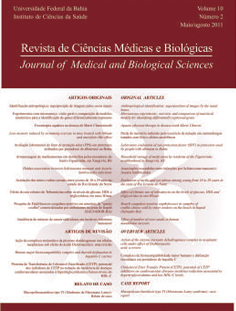Loss memory induced by swimming exercise in mice treated with lithium and anxiolytic-like effect
DOI:
https://doi.org/10.9771/cmbio.v10i2.5259Palavras-chave:
Open-field. Swimming exercise. Morris water maze. Elevated plus-maze. Lithium. Object recognition.Resumo
Previous studies have indicated that chronic exercise mimics some of the central nervous system effects observed after antidepressant drug treatment. The purpose of this work was investigated the possible effect of lithium treatment in mice swimmers in the animals models of anxiety and memory. The mice was evaluated at the elevated plus-maze, open-field, Morris water maze and object recognition. Adult male Swiss mice were divided in four groups: control sedentary (CS), lithium sedentary (LS), control swimming exercise (CE), and lithium swimming exercise (LE), treated either with normal chow or with chow containing with 0,25% lithium carbonate for 30 days. The results suggest that lithium treatment, swimming exercise or lithium treatment combined with swimming exercise induces an anxiolytic-like effect in mice in the elevated plus-maze test. These symptoms were observed in LS as an increase in time spent in the open arms and open arms entries (F = 3.238; p<0,05 and F = 4.093; p<0,05; respectively); while CE - LE showed an increase in time spent in the risk assessment (F = 17.644; p<0,001). The open-field tests indicated a reduction of fear and an increase in exploratory activity. The LS - CE reduced the time spent in the freezing (F = 3.274; p<0,05) and CE - LE increased the time spent in the rearing (F = 9.149; p<0,001). Comparison within each group during the five days of Morris water maze test, showed a decrease of latency time us groups LS - CE from the second day the testing (F = 21.512; p<0,001 and F = 3.688; p<0,001; respectively). In object recognition test, mice of group CE increased in exploration ratio in both short (STM) and long-term object recognition memory (LTM), when compared to CS (F = 9.246; p<0,001). The groups LS - LE did not differ significantly from CS (p>0,05). The present study found that swimming exercise and/or lithium treatment induced an anxiolytic-like effect, indicating that interactions between physical activity and/or lithium may be beneficial. However, the lithium treatment prevents the increased in learning and memory improvement induced by swimming exercise. The results provide evidence that stimulates investigation of the possibility that swimming exercise, in conjunction with lithium treatment, could represent a new approach to improvement of behavioral management in depression.
Downloads
Downloads
Publicado
Como Citar
Edição
Seção
Licença
A Revista de Ciências Médicas e Biológicas reserva-se todos os direitos autorais dos trabalhos publicados, inclusive de tradução, permitindo, entretanto, a sua posterior reprodução como transcrição, com a devida citação de fonte. O periódico tem acesso livre e gratuito.






